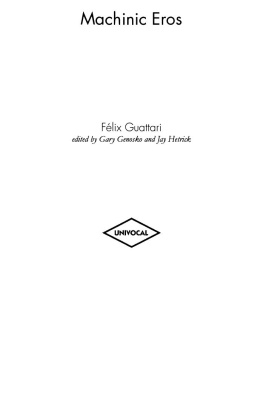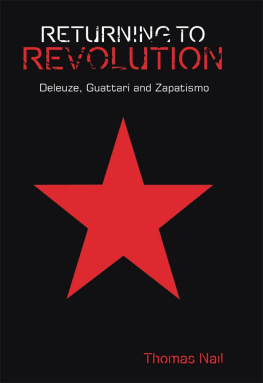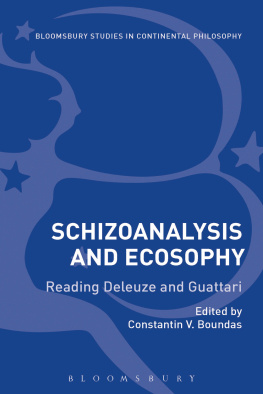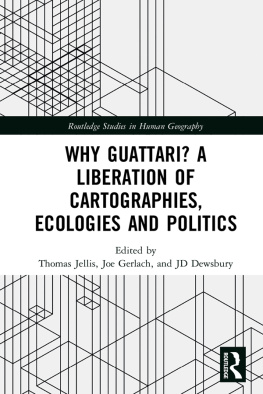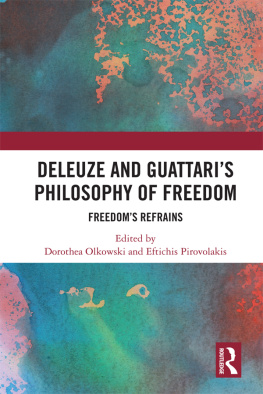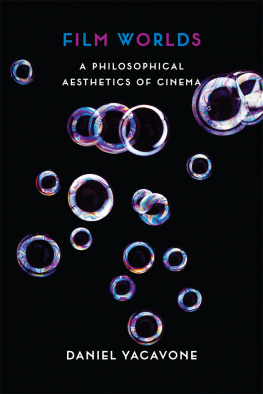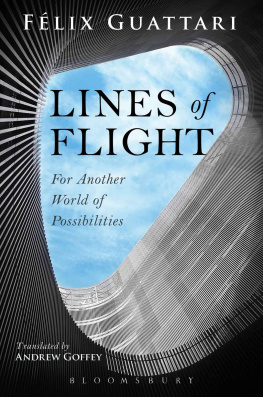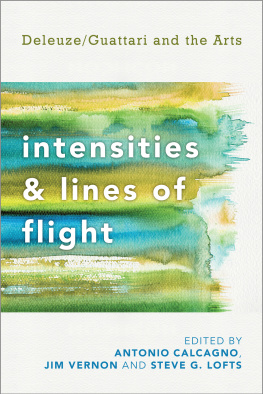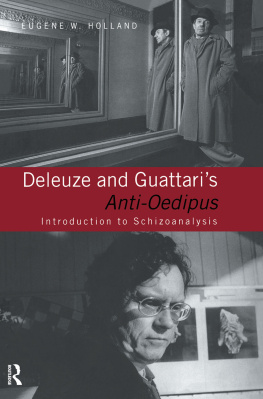Ecosophical Aesthetics
For Louise and James
Also available from Bloomsbury
Deleuze and Art, Anne Sauvagnargues
Aesthetics of Ugliness, Karl Rosenkranz
Schizoanalysis and Ecosophy, edited by Constantin V. Boundas
The Animal Catalyst, edited by Patricia MacCormack
Posthuman Glossary, edited by Rosi Braidotti and Maria Hlavajova
General Ecology, edited by Erich Hrl and James Burton
The Three Ecologies, Flix Guattari
Ecosophy, Flix Guattari
Schizoanalytic Cartographies, Flix Guattari
Eco-Aesthetics, Malcolm Miles
Anti-Oedipus, Gilles Deleuze and Flix Guattari

Contents
Figures
Table
Of Being Numerous (#7) by George Oppen, from New Collected Poems, copyright 1968 by George Oppen, is reprinted by permission of New Directions Publishing Corp.
The editors would like to thank Pierre Joris for his kind permission to cite from his published works.
We would also like to thank Drew Burke at Univocal Publishing for permission to include a revised version of Chapter 6 which previously appeared in Flix Guattari, A Love of UIQ (The University of Minnesota Press, 2016). Copyright by the Regents of the University of Minnesota.
Many thanks to the following for permission to reproduce artworks: The Museum Tinguely, Basel, and Sean Kelly Gallery, New York, for allowing us to use images by Jean Tinguely and Marina Abramovi respectively, as well as the Artist Rights Society; and Penelope Gottlieb for providing reproductions from her Extinct Botanicals and Invasive Species series.
Special thanks to Liza Thompson and Frankie Mace at Bloomsbury for their enduring support in the project.
Charlie Blake is currently visiting Senior Lecturer in Media Ethics and Digital Culture at the University of West London. The founding and executive editor of Angelaki: Journal of the Theoretical Humanities, Blake is also a composer, musician and performer in the Manchester-based post-industrial cabaret ensemble Babyslave, who have recently released two albums Kill for Dada and Runt on Valentine Records. He has co-edited theory collections such as Shadows of Cruelty: Sadism, Masochism and the Philosophical Muse (2009), Beyond Human: From Animality to Transhumanism (2012) and Immanent Materialisms: Speculation and Critique (2017), and has published variously on Blanchot and music, Deleuze and angelic materialism, Bataille and divine dissipation, hypostitional analysis, death and xenosonics, art, paranoia and parasite capitalism, the topology of serial killing, a new history of the music of hell, and the greater politics of barnacles, bees and werewolves.
Joff P. N. Bradley is associate professor in the faculty of language studies at Teikyo University in Tokyo, Japan. He is the co-author of Deleuze and Buddhism (2016) with Tony See, and co-writer of A Pedagogy of Cinema (2016) and co-editor of Educational Philosophy and New French Thought (2017) with David R. Cole. His book Principles of Transversality in Globalization and Education is expected to be published in 2018. Bradley is a member of the New Tokyo Group in Japan, a committed group of language scholars working on critical pedagogy projects in the nations capital and beyond.
Jason Cullen completed his PhD in 2014 and is an early career researcher. His thesis was concerned with Deleuzes holistic ontology and he is currently working on building a bridge between this ontological project and a philosophical vision of ethology. He is interested in the history and philosophy of biology, as well as ecology, ethology and the ethics of human-animal relations.
James Fowler holds a PhD in experimental psychology from City University London. He began working with families of adolescents with severe antisocial behaviour in 2006. Fowler has worked as a principal psychologist within the National Health Service in the UK, supervising a team of therapists working with this same population; he currently works as a forensic psychologist with violent adult offenders.
Aranye Fradenburg Joy is a Professor of English and Comparative Literature, founder and former director of the English Departments specialization in Literature and the Mind and faculty at the New Center for Psychoanalysis, with a private practice in psychoanalysis in Santa Barbara, California. She received her PhD from the University of Virginia and taught at Dartmouth College before moving to University of California, Santa Barbara. Her particular interests are mind studies, psychoanalytic theory, and medieval English and Scottish literary culture. She is the author of City, Marriage Tournament: Arts of Rule in Late Medieval Scotland (1991); Sacrifice Your Love: Psychoanalysis, Historicism, Chaucer (2002); Staying Alive: A Survival Guide for the Literary Arts (2013), and many articles on psychoanalysis, psychosomatics, and the relationship between contemporary thought and medieval studies.
Colin Gardner is Professor of Critical Theory and Integrative Studies at the University of California, Santa Barbara, where he teaches in the departments of Art, Film & Media Studies, Comparative Literature, and the History of Art and Architecture. Gardner has published Joseph Losey (2004) and Karel Reisz (2006) as well as Beckett, Deleuze and the Televisual Event: Peephole Art (2012), a critical analysis of Samuel Becketts experimental work for film and television and its relation to the philosophical writings of Deleuze and Guattari. His most recent book is Deleuze and the Animal (2017), co-edited with Patricia MacCormack.
Penelope Gottlieb received her BFA from the Art Center College for Design in Pasadena, and her MFA from the University of California, Santa Barbara, where she currently lives and works. Gottliebs paintings appropriate a methodology common to both Surrealism and the Baroque, namely the linking together of heterogeneous, diverse orders of things in this case the normally separate analytical syntax of Audubon and plant biology in the form of a representational mash-up or heterotopia. Painting directly over pre-existing Audubon prints, Gottlieb literally envelops the birds in a tightly woven braid of plant leaves, tendrils and tentacles, so that what would normally be part of the birds natural habitat has suddenly turned on them as a form of domestic colonization. Gottlieb thus raises implicit issues of power/knowledge in relation to systems of classification in addition to her more explicit ecological critique.
rene c. hoogland is Professor of English at Wayne State University in Detroit, where she teaches literature and culture after 1870, critical theory, visual culture, cultural studies, and queer theory. She is the editor of Criticism: A Quarterly for Literature and the Arts and senior editor in chief of Macmillan Interdisciplinary Handbooks: Gender. hooglands most recent book is A Violent Embrace: Art and Aesthetics After Representation (2014).
Zach Horton is Assistant Professor of English at the University of Pittsburgh. His research focuses on the intersection of technological mediation, ecology and scale. His current projects include a study of the cosmic zoom and the development of a transdisciplinary theory of scale, as well as a cultural history of geoengineering. Horton is also a filmmaker and camera designer.
Patricia MacCormack is Professor of Continental Philosophy in English, Communication, Film and Media at Anglia Ruskin University, Cambridge. She has published extensively on Deleuze, Guattari, Blanchot, Serres, Irigaray, queer theory, teratology, body modification, posthuman theory, animal rights, human extinction and horror film. Her work includes Inhuman Ecstasy (


